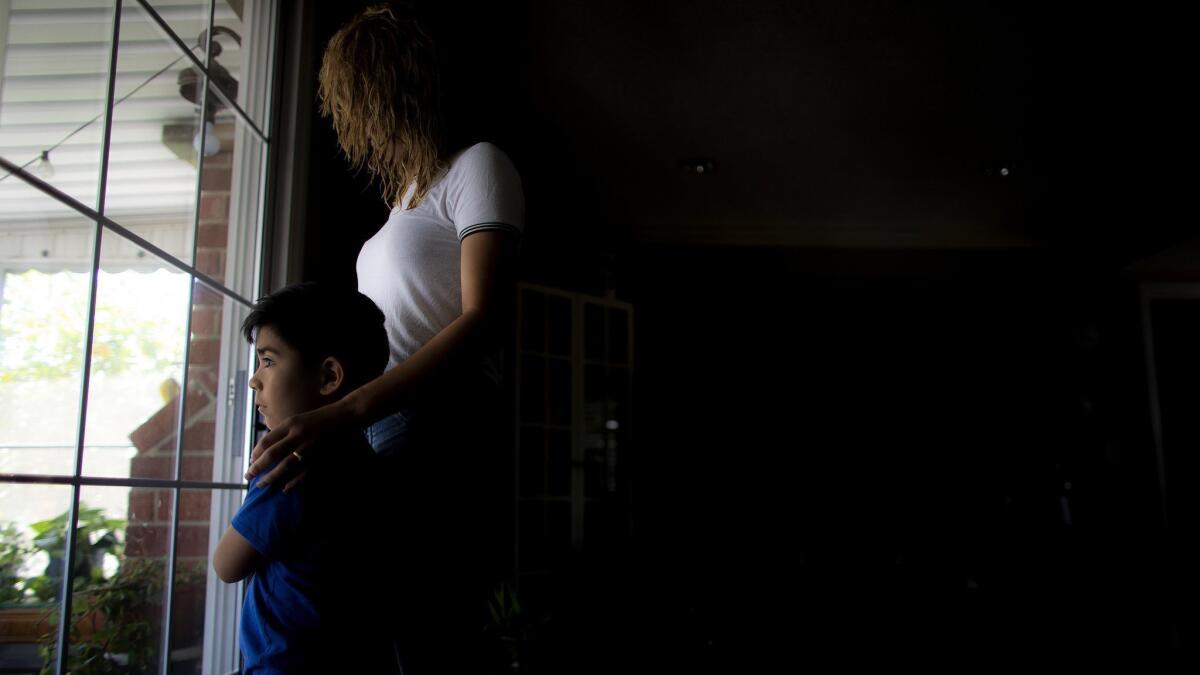Trump closed a little-known door for family reunification, leaving refugees stranded

She dreamed for 16 years of bringing her children from El Salvador to live with her near San Francisco.
Her youngest daughter and her grandson were set to arrive in February 2017, thanks to a federal program that reunited Central American children with their parents in the United States. But the month came and went without their anticipated flight confirmation from immigration authorities.
It wasn’t until August that the mother, identified by her lawyers as S.A., found out that the Trump administration had quietly ended the program.
“When I realized that everything had come crashing down, I suffered a lot,” the 52-year-old said in a recent phone interview while on a break from her job at a lice-removal company. “It still hurts not having them here.”
The demise of the program was just the latest rollback under President Trump of an Obama-era humanitarian relief initiative. The current administration has abruptly ended programs including the Deferred Action for Childhood Arrivals and a case management program meant to keep asylum-seeking families out of detention.
The so-called Central American Minors program was created in late 2014 in response to a surge of tens of thousands of unaccompanied children fleeing violence in the region. The program was billed as a safe alternative to a dangerous journey north through Mexico. It allowed immigrants who were lawfully present in the U.S. to apply for refugee status or humanitarian parole on behalf of their children under age 21, as well as their own spouses and grandchildren living in El Salvador, Guatemala or Honduras.
The program failed to stem the flow of unaccompanied children. But it worked as a way to reunite some families.
Doris Meissner — who led the Immigration and Naturalization Service from 1993 to 2000 and now serves as director of the U.S. immigration policy program at the Migration Policy Institute — said that “the CAM program, as modest as it was, was always an effort to create a safer way of coming to the United States for people who actually had an eligibility to come.”
“Cutting that off simply worsens what it is [the Trump administration] say that they’re trying to deter.”
S.A. is one of six plaintiff families in a class-action lawsuit filed earlier this month in California against the administration over the termination of the refugee program.
The lawsuit alleges that the government secretly ended the program days after Trump took office in January 2017 but didn’t publicly announce the decision until that August, violating their constitutional rights to due process and equal protection.
Lawyers say U.S. Citizenship and Immigration Services did this despite continuing to accept funds from applicants, including $400 for DNA tests, $100 or more for medical exams and $1,400 for each child’s plane ticket. In response to a Freedom of Information Act request by the International Refugee Assistance Project, the citizenship agency released emails showing that it had canceled more than 2,000 CAM interviews scheduled beginning in January.
A spokeswoman said the agency could not comment on pending litigation.
When the program ended, more than 2,700 young people had their conditional approvals to relocate to the U.S. rescinded, according to the complaint.
All had left the Northern Triangle, the area in Central America made up of El Salvador, Guatemala and Honduras. The three countries have some of the highest murder rates in the world due to rampant corruption, drug trafficking and gang activity.
The complaint asks that the court reinstate those conditional approvals and allow the beneficiaries the opportunity to travel to the U.S.
Among the applicants to the program was S.A.’s daughter — identified as J.A. in the complaint — who had completed every step of the process and was awaiting flight information from the U.S. government when the administration blocked her travel.
S.A. has had temporary legal protection in the U.S. since 2001 under a program designed to help citizens of countries experiencing armed conflict or other conditions that prevent them from returning safely.
Her abusive husband left while she was pregnant with J.A., their third child, during the country’s civil war. She peddled household goods door-to-door in a violence-wracked San Salvador neighborhood to make ends meet.
Leaving her children in the care of her father and sister, S.A. immigrated to the U.S. in search of work. Now she sends money twice a month and talks to them almost every day.
J.A. was 20 and her son was a year old when S.A. applied to the CAM program on their behalf in August 2015. Her other children, now ages 25 and 27, were too old to qualify.
In February 2017 she sent money for their flight reservations — bringing the total she paid to nearly $5,000 — and was told that they’d be able to travel about two weeks after the payment was received.
Six months later, S.A. called migration authorities in El Salvador and learned her daughter and grandson would not be allowed to go to the U.S.
Other plaintiffs include a teenage girl who was forced to drop out of high school a few months short of her graduation because an MS-13 gang member was trying to forcibly “date” her and she feared she could be raped or killed; a teen boy beaten so badly after refusing to join MS-13 that he required surgery and now uses a cane to walk; and another teen boy whose uncle was shot and killed by MS-13 outside the boy’s home.
Under the program, applicants were screened in their home countries for refugee resettlement.
Even if the applicant didn’t meet the specific refugee eligibility criteria, they were automatically considered for renewable parole if the U.S. government determined that they were “at risk of harm.”
During the time that the program existed, more than 15,000 people applied, according to the State Department. More than 2,100 were resettled as refugees, the government said, meaning they could apply for legal residency after one year. Another 1,500 were allowed in the U.S. as parolees, permitted to remain only as long as their work permits remain active.

One such case involves Andrea, a 22-year-old Salvadoran woman who arrived two years ago as a parolee to reunite with her mother after nearly two decades apart. Andrea’s work permit expired last month, leaving her and her 4-year-old son Mateo without legal protection.
Her mother, Maria, had been caught illegally crossing the border in the Arizona desert in 1998. She spent a month in immigrant detention but later became a beneficiary of Temporary Protected Status.
Maria, who now lives in Orange County, said she didn’t want her daughter to risk making the same journey through Mexico and entering the country illegally.
“I didn’t want her to suffer how I suffered,” she said.
Instead, Andrea was raised by her grandparents in San Salvador. She had all but stopped leaving the house except to go to work as a hair stylist after seeing two dead bodies at a nearby open-air market.
“I’ll never forget the faces of those people,” she said. “I didn’t want my son to see that.”
Andrea, who asked that The Times not reveal her last name out of concern that she could be deported, now works full time cleaning a hotel. In March, she got married and is preparing to file for legal residency through her husband.
According to the complaint over the CAM program’s ending, some parents took out loans to pay for plane tickets, sometimes with only days notice from migration authorities. Some paid hundreds of dollars to safely transport their children from their hometowns to attend numerous interviews in the capital cities of each country.
Parents waited nearly a year for flight reimbursements. The only other costs reimbursed were DNA tests. Many spent extra money on accommodations and new clothes for their children’s arrival.
After the CAM program was terminated, the International Organization for Migration told applicants who had been conditionally approved for parole — and all of whom had been deemed ineligible for refugee resettlement — that they could file a request for review of the denial of refugee status within 90 days.
Linda Evarts, an attorney with the International Refugee Assistance Project who represents the plaintiffs, said most haven’t heard back.
A few months after finding out the CAM program had been terminated, S.A. was diagnosed with breast cancer. Her only relatives in the U.S. are nephews, most of them in other states, and she lamented not having the support of her daughter during surgery and chemotherapy.
Meanwhile, J.A. remains in her small hometown three hours from San Salvador. She relies on the money her mother sends to survive.
“Her dream was to come here and give her son a better life,” her mother said. “All I can hope for is a miracle.”
More to Read
Sign up for Essential California
The most important California stories and recommendations in your inbox every morning.
You may occasionally receive promotional content from the Los Angeles Times.











